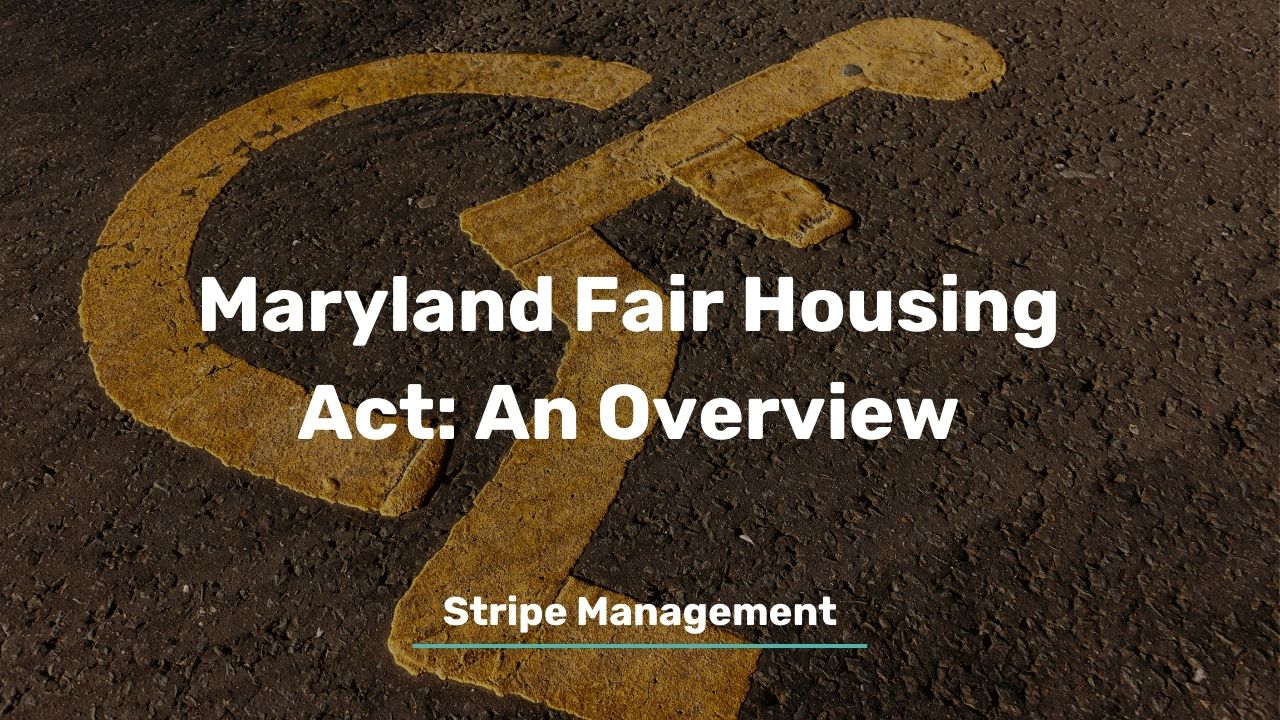
Ensuring fair and equitable access to housing is not just a moral obligation—it’s the law. For landlords in Maryland, understanding the Fair Housing Act and related state regulations is crucial to running a successful and compliant rental business.
These landlord tenant laws outline specific protections for tenants and prospective tenants, prohibiting discriminatory practices in the rental process. Failing to comply with fair housing laws can result in significant legal and financial penalties.
This article by Stripe Management will break down the key aspects of the Fair Housing Act and related laws in Maryland. By understanding these rules, landlords can ensure compliance and foster positive relationships with their tenants.
Understanding the Fair Housing Act
Overview of the Fair Housing Act
The Fair Housing Act, enacted in 1968 as part of the Civil Rights Act, is a federal law designed to prevent discrimination in housing. It applies to most housing transactions, including renting, selling, or financing a property.
The Fair Housing Act aims to ensure that everyone has equal access to housing opportunities, regardless of certain characteristics. In Maryland, this federal framework is supported by additional state and local regulations that further expand protections for renters.
What Are Fair Housing Laws?
Fair Housing laws at the federal, state, and local levels prohibit discrimination based on specific protected characteristics. These laws cover various aspects of the rental process, including advertising, screening, leasing, and property management.

Who Are the Protected Classes?
Under federal law, the following classes are protected:
- Race
- Color
- National Origin
- Religion
- Sex
- Disability
- Familial Status (e.g., families with children)
Maryland’s fair housing laws add the following protected classes:
- Marital Status
- Sexual Orientation
- Gender Identity
- Source of Income
As a landlord in Maryland, you are required to treat all applicants and tenants equally, regardless of whether their characteristics fall under these categories.
This means applying consistent standards during tenant selection and avoiding any actions that could be perceived as discriminatory. Noncompliance with these laws may lead to severe legal and financial repercussions.
Common Violations of Fair Housing Laws
Refusing to Rent to Individuals Based on Protected Characteristics
Refusing to rent to someone because of their race, religion, gender identity, or any other protected characteristic is a clear violation of fair housing laws. This includes outright refusal or using subtle methods to deter certain individuals from renting your property.
Providing Unequal Treatment to Tenants
Differential treatment—such as charging higher rents, misusing security deposits, enforcing stricter rules, carrying out unlawful evictions, or offering fewer amenities to tenants based on protected characteristics—is another common violation. All tenants should receive equal access to services and accommodations.
Asking Prohibited or Discriminatory Questions
Landlords must avoid asking questions during the application process that could be seen as discriminatory. For example, asking an applicant about their religion, marital status, or whether they receive public assistance is prohibited.

Failing to Offer Reasonable Accommodations
Landlords must provide reasonable accommodations for tenants with disabilities to ensure equal access to housing. This might include allowing a service animal in a no-pets property or installing grab bars in a bathroom. Denying such requests without valid reasons could lead to legal action.
Discriminating Against Tenants Based on Income Source
Maryland law protects tenants who rely on non-traditional income sources, such as housing vouchers or disability benefits. Refusing to rent to someone based on how they pay rent is a violation of state law.
How to Avoid Violating Fair Housing Laws
- Familiarize Yourself With Relevant Laws: It is essential to stay updated on fair housing regulations at the federal, state, and local levels. Maryland’s laws may have additional requirements that you need to follow.
- Apply Consistent Screening Standards: Use the same criteria for all applicants, regardless of their background. Ensure your application process is transparent and free from bias.
- Avoid Discrimination: Never make decisions based on a tenant’s protected characteristics. Treat all tenants equally in terms of rules, services, and lease agreements.
- Provide Reasonable Accommodations: Be willing to work with tenants who request accommodations for disabilities. Evaluate each request fairly and respond promptly.
- Exercise Caution in Advertising: Ensure that your property listings use inclusive language and avoid phrases that could be interpreted as discriminatory.
- Document Everything: Keep thorough records of all interactions, applications, and decisions. Documentation can serve as evidence if a complaint arises

Fair Housing Law Exemptions
While fair housing laws apply to most rental situations, there are some exemptions. In Maryland, these include:
- Owner-Occupied Buildings With Four or Fewer Units: If you live in a building with four or fewer rental units, you may be exempt from certain fair housing requirements.
- Religious Organizations: Religious organizations may give preference to members of their faith when renting properties, provided they do not discriminate based on other protected characteristics.
- Single-Family Homes: Owners of single-family homes who rent without the use of a broker or advertising may be exempt under specific conditions.
- Family Members: Renting to immediate family members may also be exempt from fair housing laws.
- Age-Specific Housing: Housing designed for older persons, such as 55+ communities, is allowed to impose age restrictions under specific guidelines.
Understanding these exemptions can help you determine whether your rental situation falls under fair housing laws.
Bottom Line
Fair housing laws are essential for ensuring equal opportunities in housing and protecting tenants from discrimination. As a landlord in Maryland, understanding and complying with these laws is not optional.
From recognizing protected classes to avoiding common violations and providing reasonable accommodations, landlords have a responsibility to maintain ethical and legal practices.
If you’re feeling overwhelmed or unsure about your obligations under fair housing laws, Stripe Management can help. Our team specializes in property management services that prioritize compliance, fairness, and efficiency. We provide support with tenant screening, lease agreements, and ongoing property management to ensure you stay on the right side of the law.
Contact Stripe Management today to learn how we can help you manage your properties with confidence!
Disclaimer: Please note that the information provided in this blog is intended for general guidance and should not be considered as a replacement for professional legal advice. It is important to be aware that laws pertaining to property management may change, rendering this information outdated by the time you read it.
